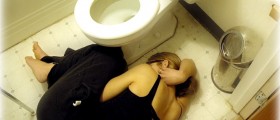
Why does it happen?
It is not rare thing to expel the feces of the different color, texture, odor and hardness. The changes of the stool, besides being dependent on the eaten food and thus the contents from the digestive system, can be very useful indicators of some underlying health problem. That is why the special attention should be paid on any abnormality considering the feces, especially if there is certain amount of the mucus mixed with blood involved.
So, when we talk about the bloody feces as the indicator, most commonly it appoints to some infection into the digestive system, except in the cases when the blood is kind of blackish, which appoints to the infection of the upper part of the gastrointestinal system.
However, the most frequent irregularity of the feces is commonly known as diarrhea, which is generally manifested as the too bland contents from the intestines. Whenever the bland stool is due to any infection caused by a parasite, it is as well accompanied with the bloody discharge. The most frequent provoker of such the condition is amoeba which tends to be located in the large intestines. The accompanying indicators of having this parasite are the weakened immune system, the urge for throwing up, the increased temperature, the painful abdomen and the cramps, and, of course, the bland stool with the mucus followed with some blood. Additionally, this condition is transmittable.
Also very common trigger of the bloody feces is the ulcer in the intestines, and it has the similar following signs as the condition mentioned above, except the stool can be black, as well. The other very common triggers is the syndrome of the irritable bowel and the condition called Crohn’s disease, which are, in fact, the inflammatory processes of the inner membrane of the intestines.
Nevertheless, if the provoker is bacteria settled in the intestines, it is usually the case of cholera, which has rather intense symptoms.How to treat it?
As far as dealing with this problem is concerned, the key to the successful treatment is to attack its provoker and not treating only the consequence, which includes only alleviation of the most prominent symptoms. So, in the case of a parasite, the medication which annihilates them will be recommended. But, if the diarrhea is prolonged, that could lead to the serious case of dehydration and the therapy must be enriched with significantly increasing the intake of water.
Nevertheless, if the even more severe depletion of water happens in the organism, and, therefore, the level of the electrolytes is disrupted, one must undergo the intervention of the substitute of the electrolytes. Of course, the eating regime must include more of the beneficial fibers and nutrients from the fruits and vegetables and the meat should be avoided.

















Your thoughts on this
Loading...